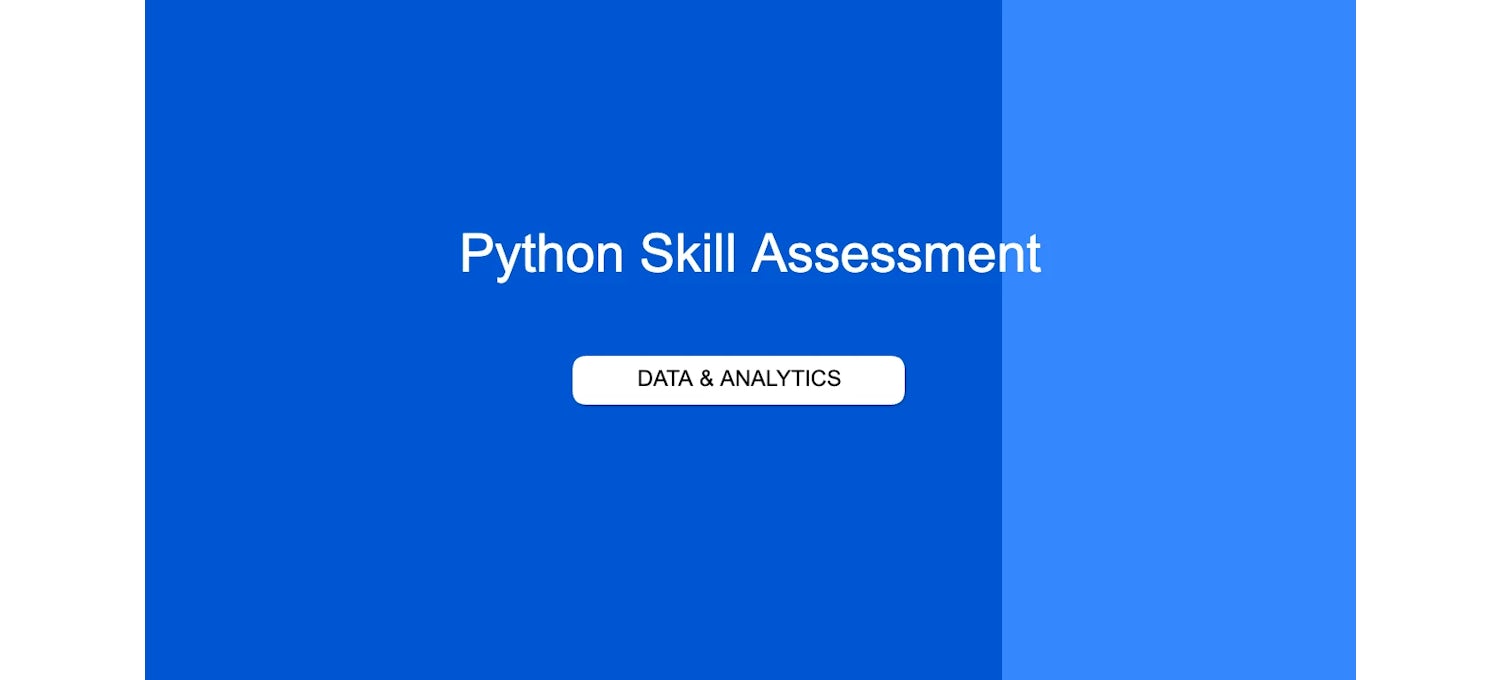Python Skill Assessment
Test your Python skills with this quick assessment. Answer 10 multiple-choice questions to get your score, then check the Scoring Guide to find your level and recommended learning path.

Python Programming Quiz
Python is a programming language used for various programming tasks, including artificial intelligence (AI), machine learning, data analytics, and data visualization. The increasing complexity of web applications and websites, and the growing reliance on machine learning and AI, contribute to the steady demand for Python developers. Answer the following skill-based Python programming questions and click Submit to calculate your score. Use your score to find recommendations that align with your current skill level and explore career paths that interest you.
Test Structure
10 multiple-choice questions
Takes approximately 5-10 minutes
Immediate results with career recommendations
Custom learning paths based on results
1. What will be the output of print(type([1, 2, 3]))?
2. Which of these is a valid way to create a dictionary?
3. What is the difference between list.append() and list.extend()?
4. What is a decorator in Python?
5. What does this code output?
x = [1, 2, 3] y = x y.append(4) print(x)
6. What is the purpose of the __init__ method in a class?
7. What is a generator in Python?
8. Which statement about Python's GIL is correct?
9. What is the correct way to handle exceptions?
try:
x = 1/0
10. What is the output of this list comprehension?
[x**2 for x in range(5) if x % 2 == 0]
Scoring Guide & Course Recommendations
Your quiz score above aligns with a general proficiency level of beginner, intermediate, or advanced. Match your score to the ranges below and explore the recommended course.
0-30: Beginner Level
Skill Level: New to Python programming
Recommended Coursera Courses:
Programming for Everybody (Getting Started with Python) by the University of Michigan
Basic Python syntax
Control structures
Functions
Python for the Absolute Beginner by KodeKloud
Fundamentals of programming
Basic data structures
File operations
Python Basics by the University of Michigan
Interactive programming
Basic algorithms
Problem-solving skills
40-70: Intermediate Level
Skill Level: Familiar with Python basics, ready for advanced concepts
Recommended Coursera Courses:
Python Data Structures by the University of Michigan
Advanced data structures
Algorithm implementation
Object-oriented programming
Using Python to Access Web Data by the University of Michigan
Web scraping
APIs
JSON and XML
Python for Data Science, AI & Development by IBM
NumPy and Pandas
Data analysis
API integration
80-100: Advanced Level
Skill Level: Experienced Python developer
Recommended Coursera Courses:
Applied Data Science with Python Specialization by the University of Michigan
Machine learning
Data visualization
Statistical analysis
Python for Data Engineeringby IBM
ETL processes
Data pipelines
Performance optimization
Skills Covered by Level
As you progress in your career using Python, different levels have different skills, and here are some common ones.
Beginner Level
Basic syntax
Variables and data types
Control structures (if/else, loops)
Basic functions
Lists and dictionaries
File I/O
Intermediate Level
Object-oriented programming
Error handling
Regular expressions
Web APIs
Database connections
Basic libraries (NumPy, Pandas)
Advanced Level
Design patterns
Generators and decorators
Multithreading/multiprocessing
Memory management
Performance optimization
Advanced frameworks
Career Paths
Your Python career path will be unique to your strengths and interests. Below are some common roles at different skill levels. Explore our Web Development Career: Decision Tree to understand better how your Python and programming skills can take your career in an exciting direction.
Beginner Level: Junior Python Developer, QA Engineer
Intermediate Level: Software Developer, Data Analyst
Advanced Level: Senior Developer, Data Scientist, Machine Learning Engineer
Interested in a career working with Python? Build job-ready skills and earn a credential for your resume with the Google IT Automation with Python Professional Certificate.
Coursera
Writer
Coursera is the global online learning platform that offers anyone, anywhere access to online course...
This content has been made available for informational purposes only. Learners are advised to conduct additional research to ensure that courses and other credentials pursued meet their personal, professional, and financial goals.